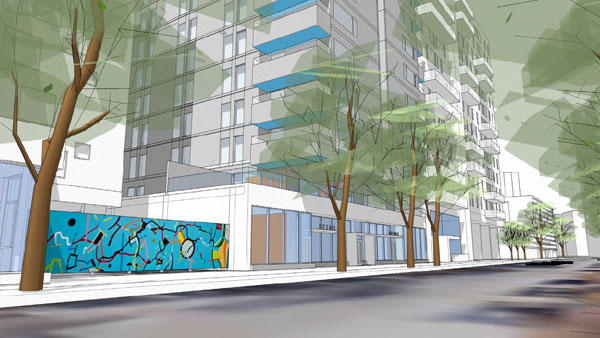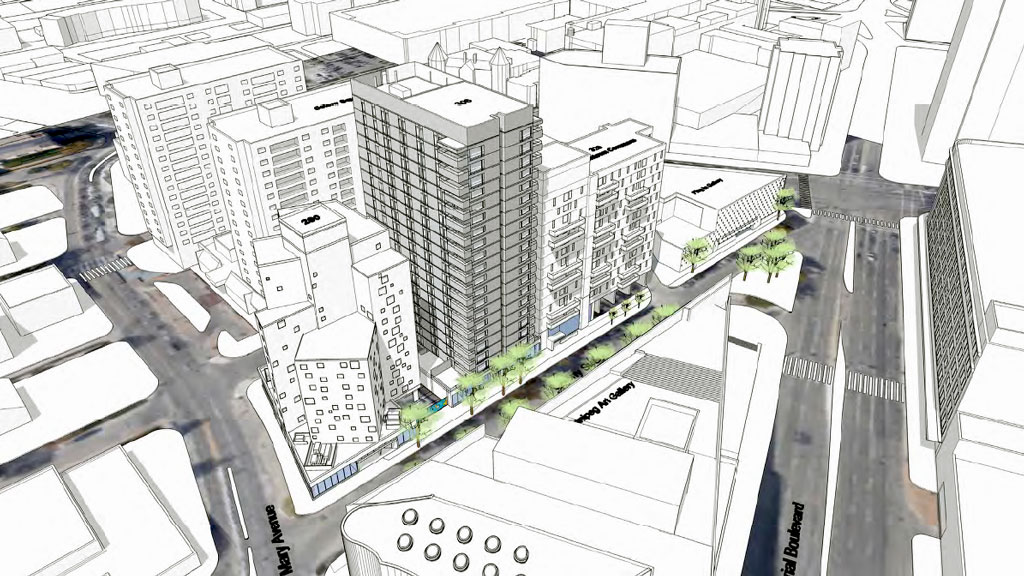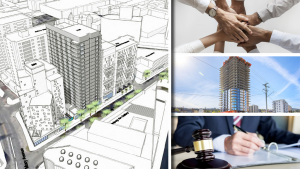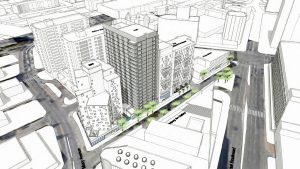The University of Winnipeg Community Renewal Corporation 2.0 (UWCRC 2.0) is building a socially inclusive mixed-income, mixed-use, 21-storey residential highrise in downtown Winnipeg.
Developed in partnership with Lotus Holdings Winnipeg, the project at 308 Colony St. will join a growing collection of residential highrises in the area.
Located near the Winnipeg Art Gallery and the former Hudson’s Bay Company department store on Portage Avenue, 308 Colony will be near two other UWCRC 2.0 residential projects.
The $77 million project will contain 214 apartments, 86 of which will be set aside for affordable housing.
Affordable rent levels will be between 59 per cent and 69 per cent of the CMHC median market rent for the neighbourhood.
308 Colony will have an outdoor green space terrace, gym, lounge and laundry facilities.
The project will also have four ground-floor commercial spaces.
Bockstael Construction Ltd. is the construction manager of the project.
Bockstael co-president Dan Bockstael says piling began in September 2023 and the superstructure will be complete by December 2024.
Occupancy is scheduled for December 2025.

“It will be the first residential tower in Winnipeg with net-zero carbon building certification, thanks to such advanced energy-efficient technologies as air-source heat pumps, solar thermal panels for water preheat and building integrated photovoltaic cladding,” says Bockstael.
The project has come with some challenges.
“We’re building on a tight downtown site,” he says. “It’s in the back of the art gallery and near a couple of other UWCRC highrises.”
Another challenge facing the construction team is balancing the project’s high sustainability goals with the need to control costs and minimize disruptions.
“The integration of energy-efficient systems required meticulous planning and co-ordination,” says Bockstael. “Effective logistical management ensured that downtown activities continued with minimal interruption.”
UWCRC 2.0 has become one of the single largest developers in the Colony Street neighbourhood, a small residential-commercial enclave not far from downtown business and government offices.
Other UWCRC 2.0 residential highrises in the area are West Broadway Commons (167 Colony), Muse Flats (290 Colony) and Downtown Commons (320 Colony).
UWCRC 2.0 chief executive officer Jeremy Read says the not-for-profit charity is mandated to develop wholly-owned or joint venture real estate developments, and to provide development, project management and property management services to other post-secondary institutions, non-profit organizations and First Nations clients.
“It is not controlled by the University of Winnipeg, and it can work off-campus,” says Read.
Created in 2016, UWCRC 2.0 runs in parallel to UWCRC, which was created 11 years earlier. The older organization is responsible for development of the University of Winnipeg campus.
Read and Dr. Ted Jackson, who is a senior research fellow at the Carleton Centre for Community Innovation at Carleton University, have researched the subject of affordable housing.
They say UWCRC 2.0’s mixed-income, mixed-use residential towers are a scalable model in North America.
The model offers nearly one-half of its units at affordable rental prices, and its buildings are designed, built, and managed with a commitment to sustainability.
Read and Jackson say the main elements of the UWCRC 2.0 model are the following:
- Creating a mix of premium, market-rate and affordable units in the same
multi-storey tower with each unit having the same basic design features;
- designating 40 per cent to 51 per cent of the units as affordable housing, according to government regulations;
- giving priority to the housing needs of such marginalized groups as Indigenous, immigrant and refugee households and people with disabilities;
- providing street-level retail space for non-profits, cultural groups, cafes,
and local small businesses;
- creating shared community space in the building for resident and
community gatherings;
- designing and building to green standards and using “environmentally
appropriate” design and materials;
- integrating “eco-services,” such as onsite bicycle storage and car-sharing; and
- mobilizing a combination of public and private financing, including funding from all levels of government, conventional borrowing, and investments that are socially or environmentally beneficial.
“North America’s affordable housing crisis deserves an all-hands-on-deck response,” says Jackson. “All public institutions should find ways of helping to solve this problem.”
Jackson says universities and colleges have real estate development arms that are usually directed to their own internal needs, such as building student residences.
“But post-secondary institutions receive government funding and, like other taxpayer-funded organizations, should step up,” says Jackson. “There are many cities like Winnipeg that need downtown revitalization, where these building projects can stabilize neighbourhoods and also generate economic multipliers through construction and post-build operations.”







Recent Comments
comments for this post are closed